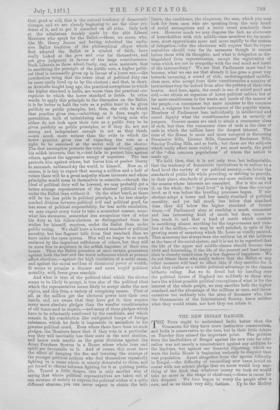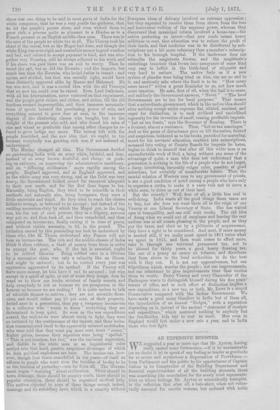THE NEW INDIAN DANGER.
THE Peers ought to understand India better than the Commons, for they have more instinctive conservatism, and India is conservative to the toes, but in their little debate on Tuesday they missed the important point. The petition from the landholders of Bengal against the new rate for edu- cation was not merely a remonstrance against any addition to the land-tax, but against our financial fidgetting, which we warn the India House is beginning seriously to disquiet that vast population. Apart altogether from the special difficulty in Bengal,—the difficulty of reconciling new taxes levied on rental with our solemn pledge that we never would levy any- thing of the kind, that whatever money we took we would take no more in the shape of chief-rent,—there is cause for this disquiet. We have begun to worry the people after a new, and as we think very silly, fashion. Up to the Mutiny there was one thing to be said in most parts of India for the white conqueror, that he was a very gentle tax-gatherer, that he let the people's purses alone, and even wished them to grow rich, a process quite as pleasant to a Hincloo as to a French peasant or an English middle-class man. There was in the eyes of the people no white tax at all. The Viceroy took his share of the rental, but so the Mogul had done, and though the white King was over-rigid, and wanted his money in good weather and bad, and refused to accept payment in kind, and was alto- gether very Prussian, still he always adhered to his word, and if his share was paid there was an end to worry. Then ho taxed the salt, but so did the Nuwabs ; and the imports, but much loss than the Nuwabs, who levied duties in transit ; and opium and alcohol, but that was morally right, would have been distinctly approved alike by Munoo and Mahomet. No tax was new, and it was a rooted idea with the old Viceroys that no new tax could ever be raised. Even Lord Dalhousie, with all his determination, never ventured on that experiment, and the people grew richer, and richer, and richer, till the old burdens seemed imperceptible, and their immense accumula- tions of specie lowered the purchasing power of coin, and everything seemed to grow dear at once, to the immense disgust of the chattering classes who bought, but to the delight of the peasant who sold, and who found his sales of rice and wheat so profitable that among other changes he re- fused to grow indigo any more. The money left with the people fructified, and the new idea that we ought to tax because everybody was growing rich was, if not unheard of, undeveloped.
The Mutiny changed all this. The Government decided on garrisoning India with an army white, faithful, and dear, instead of an army brown, doubtful, and cheap; on push- ing on railways, on improving the administrative machinery, and on " diffusing civilization " more rapidly among the people. England approved, and as England approved, and as the white army was very strong, and as the Debt was very heavy, the Government looked round for resource's-adequate to their new needs, and for the first time began to tax. Naturally, being English, they tried to be scientific in their methods, and naturally also, being foreigners, they were a little uncertain and timid. So they tried to reach the classes hitherto exempt, or believed to be exempt ; but instead of the rattling succession-duty by which the Mogul got, in the long run, his due out of such persons, they in a fidgetty, nervous way put on, and then took off, and then remodelled; and then reimposed an income-tax, finally raising it in time of peace, and without visible necessity, to 8d. in the pound. The irritation caused by this proceeding can best be understood by those who, like M. Tillers, understand why France will not bear an income-tax. The rich and the middle-classes of India think it sheer robbery, a theft of money from them in order to exempt the poor, who, if the tax is essential, ought to be robbed likewise. Being robbed once in a lifetime by a succession claim was only a calamity like an illness, and might be endured ; but to bo robbed every year was oppression aggravated by its method. If the Viceroy will have more money, let him have it and be accursed ; but why except in a spirit of spite, or out of some deep design, does he want us to show our hooks, strictest of family secrets, and help everybody to rob us because wo are prosperous, or dis- honour us because we are sinking ? It is quite useless to talk of scientific finance to natives ; they are not scientific finan- ciers, and would rather pay 10 per cent. of their property, levied once in a generation, than pay a twopenny income-tax to a collector who " wants to know " everything they are determined to keep quiet. As soon as the war expenditure ceased, the well-to-do were almost ready to fight, they were so irritated by the continuance of the impost, and their irrita- tion communicated itself to the apparently untaxed multitudes, who were told that they must pay more rent, more " ceases," higher prices, because their superiors were being "spoiled." " This is not taxation, but loot," was the universal expression, and dislike to the white man as an inquisitorial ruler settled into that hard, passive, suspicious ill-temper of which in Asia political explosions are born. The income-tax, how- ever, though four times remodelled in ten years—of itself an offence to people who want even the troubles of to-day to be as the troubles of yesterday—was far from all. The Govern- ment began " worrying " about civilization. There should be town drainage, there should be country roads, there should bo popular education, there should be organized medical help. The natives objected to none of these things except, indeed, drainage and its subsidiary laws, which in a country without
European ideas of delicacy involved an extreme oppression ; but they expected to receive them from above, from the free and benevolent volition of the supreme power, whereas they discovered that municipal reform involved a house-tax----the native preferring an octroi—that new roads meant heavy additions to rent, that education was to reduce the profit of their lands, and that medicine was to be distributed by sub- scriptions not a bit more voluntary than a member's subscrip- tion to his borough hospital. If the landowner does not subscribe the magistrate frowns, and the magistrate's underlings translate that frown into annoyance of some kind very easy to inflict in the birth-land of etiquette and
very hard to endure. The native feels as if a new system of plunder were being tried on him, can see no end to it, and anxiously asks where the limit is to be. "How many more taxes ?" writes a great Zemindar to us, not how much more taxation. He asks, first of all, when the hail is to cease, and suddenly the Government answers, "Never." " The local Governments are to tax for local purposes." That means that a subordinate government, which in the native idea should alter nothing except under supreme fiat, stinted, osurient, and eager for distinction, is to rack civilized and uncivilized ingenuity for the invention of small, teazing, profitable imposts. " Let us tax feasts," says the Governor of Bombay. There is a ferment, almost a resistance. Then, "Lot us tax marriages." And so the game of disturbance goes on till the native, fretted and suspicious, bothered as to his books, punished for marrying, taxed for his servants' education, snubbed into subscriptions, menaced into voting at County Boards for imposts he hates, begins to think to himself that after all this white man is an uncomfortable work of God, a being without any sense of the advantage of quiet, a man who does not understand that a generation is nothing in the life of a people who do not forget, a fussy, interfering, incurably vulgar ruler, possibly of good intentions, but certainly of unendurable habits. That, the mental relation of Western men to any government of priests, is not a good condition of mind among a people who have only to organize a strike, to make it a caste rule not to serve a white man, to drive us out of their land.
But the remedy ? Well, first of all, a little less zeal in well-doing. India wants all the good things these taxes are to buy, but she does not want them all in the reign of one Viceroy or one Liberal Secretary of State. She has waited ages in tranquillity, and can still wait weeks. The old idea of doing what we could out of surpluses and leaving the rest undone was at all events pleasing to the people, and as they pay the taxes, and elect us by a plebiscite of acquiescence, they have a right to be considered. And next, if more money is needed still, if we really must spend in 1871 twice what we spent in 1851, and then want ceases to effect more, take it through one universal permanent tax, not to bo altered for thirty years, a good heavy drawing tax, like one of a penny an ounce on tobacco, and distribute that from above to the local authorities to do the best with it they can. It is • not our oppressiveness, but our fidgettiness which worries the people ; not our improvements, but our reluctance to give improvements time that excites them to wrath. Every Viceroy and every Chancellor of the Exchequer wants to distinguish himself during his five years' tenure of office, and as each effort at distinction implies a new expenditure, or a new tax, or both, Mr. Lowe is a stupid Conservative compared with the Indian Government. We have made a good many blunders in India; but of them all, the introduction of an annual. "Budget," with a reputation depending on it, instead of the ancient " statement of receipts and expenditure," which mattered nothing to anybody but the fundholder, bids fair to cost us most. Men even in England would fret under a new rate a year, and in India those who fret fight.



































 Previous page
Previous page